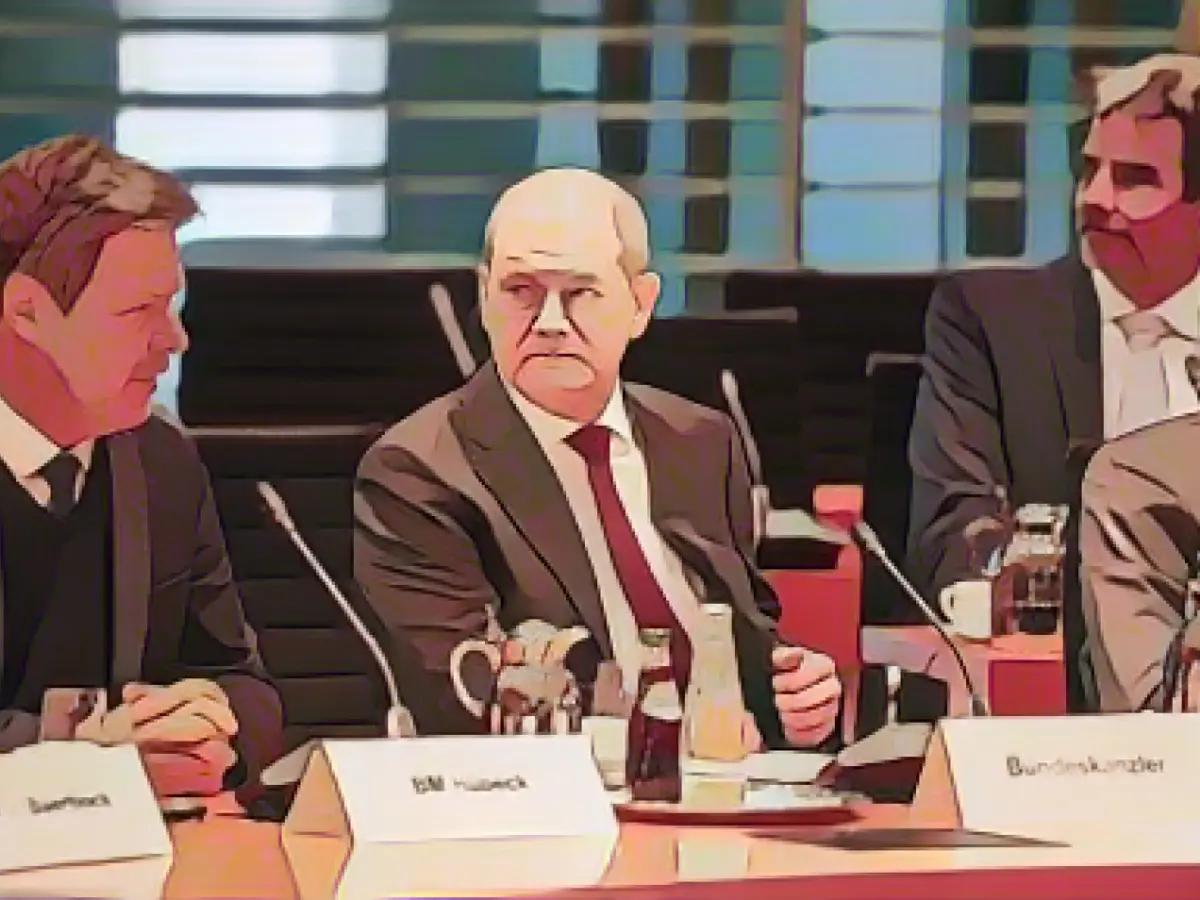Budget 2024 Negotiations: Green Light Still Awaited Amidst Power Struggle
The budget debate in Germany continues to be a contentious issue, with Chancellor Olaf Scholz (SPD), Vice-Chancellor Robert Habeck (Greens), and Finance Minister Christian Lindner (FDP) still at odds over next year's budget. Despite days of confidential talks, an agreement remains elusive. The federal government is scheduled to hold a cabinet meeting on Wednesday, but budget discussions are not officially included in the meeting's agenda as of Tuesday evening.
Two possible outcomes for the adoption of the budget this year include the cabinet giving the green light for the plans during the meeting or making a decision through a circular resolution, which would entail written approval rather than a formal cabinet approval. In this scenario, the Budget Committee or the Bundestag would discuss the matter first, potentially during a special budget week closer to Christmas, with the Bundesrat giving its approval on December 22.
The budget crisis has been exacerbated by the ruling of Germany's highest court three weeks ago, which declared the reallocation of 60 billion euros null and void. According to Finance Minister Lindner, approximately 17 billion euros are now missing from the federal budget for 2024. The money had been designated as a coronavirus loan that was intended for investments in climate protection and modernizing the economy. The court also ruled that the federal government could not repurpose loans approved in emergency situations for future use.
Meanwhile, the tug-of-war over the citizens' income continues, as the coalition leaders try to reconcile possible savings in social spending. The CDU/CSU has maintained its demand for an adjustment to the citizens' income to encourage employment instead of incentivizing inactivity. According to the Federal Employment Agency, the increase in the citizens' income planned for January 2024 cannot be retracted due to technical reasons, as the payment processes have already begun.
While the coalition leaders negotiate, the FDP has advocated for a reassessment of the standard rates for the citizens' income in view of the slowdown in inflation. The chairman of the FDP parliamentary group in the Bundestag, Christian Dürr, has called for savings in the 2024 budget if the citizens' income increase surpasses inflation rates and proposed a potential "zero round" for 2025.
Insights:
- Negotiations over the budget have been particularly challenging due to the conflict between the SPD and FDP over the debt brake rule. The FDP has insisted on compliance with the rule, while the SPD and Greens have advocated for its relaxation or reform to accommodate increased spending on defense, infrastructure, and social welfare.
- The Federal Constitutional Court's ruling in November 2023, which declared the use of a special off-budget fund unconstitutional, had a significant impact on the budget negotiations. The ruling restricted the coalition's ability to circumvent the debt brake rule through special off-budget funds, leading to the eventual collapse of the coalition government.
- These negotiations over the federal budget for 2024 between the SPD, Greens, and FDP leaders have been ongoing for some time, without reaching an agreement.
- The German federal government is eagerly anticipating the outcome of the cabinet meeting on Wednesday, hoping for a decision on the budget plans.
- The loss of 17 billion euros from the federal budget following the Federal Constitutional Court's ruling is causing significant budgetary difficulties, according to Finance Minister Christian Lindner.
- If the cabinet approves the budget plans, the Budget Committee and the Bundestag will debate the matter first, possibly during a special budget week before Christmas in Berlin.
- As the coalition leaders negotiate, the debate over possible savings in social spending, such as the citizens' income, continues, with the CDU/CSU demanding an adjustment to prevent inactivity.
- The Bundesrat may approve the budget plans on December 22, but only if the Bundestag has already deliberated on the matter during a special budget week prior to Christmas.
Source:
Enrichment Data:
- The SPD, Greens, and FDP were previously part of the previous governing coalition. However, the coalition collapsed in November 2024 due to irreconcilable differences over the debt brake rule.
- The debt brake rule, which caps the structural budget deficit at 0.35% of GDP, is a major point of contention. The FDP has insisted on adhering to the rule, while the SPD and Greens have advocated for its relaxation or reform to accommodate increased spending on defense, infrastructure, and social welfare.
- In November 2023, the Federal Constitutional Court ruled that the use of a special off-budget fund, the "Fund for Transformation and Climate," was unconstitutional. This fund was intended to finance green investments and was fed by unused pandemic-related borrowing.
- The Federal Constitutional Court's decision significantly affected the budget negotiations by restricting the coalition's ability to circumvent the debt brake rule through special off-budget funds.
- Possible future coalition combinations consist of the CDU/CSU and either the SPD or the Greens. Both the SPD and Greens support relaxing or reforming the debt brake, while the CDU/CSU and FDP generally favor maintaining it. However, there is a possibility of reforming the debt brake in coalition negotiations if a two-thirds majority can be secured in parliament.








